Reviews
John Ford
USA, 1928
Credits
Review by David Carter
Posted on 10 February 2009
Source 20th Century Fox DVD
Categories The Silence After Sound: Hollywood’s Last Silent Movies
“The Old World - A sleepy contented village, people gentle and kind - “
The above is the first intertitle in Four Sons. It does more than simply set the scene; it is an ominously foretelling statement. A dual meaning of “Old World” - one spatial and one temporal - is at work here. In the first regard is the idea of an Old World of Europe, the setting and the sense in which the American audience would most readily acknowledge the term. The second and more important to the film’s meaning is the idea of an “Old World” as a point in time. Referring to it as “old” is to imply that a “New World” exists or, more to the point, that the “Old World” does not. This intertitle informs the audience that while physically set in Europe, the opening of Four Sons takes place in a world that no longer exists.
Four Sons begins on Mother Bernle’s birthday, an eventful day for her small village. Her four sons - Joseph, an easygoing farmer, Johann, a smith, Franz, a soldier, and the young shepherd Andres - are introduced through a clever montage as she puts each boy’s laundry in a drawer marked with his name. Mother’s birthday is celebrated by all in the village, but two seemingly minor events have more importance for the future of all involved. Firstly, Major Von Stomm, an exaggerated cinematic stereotype of an “evil German,” complete with scar and monocle, arrives in town to take control of the garrison. Joseph accidentally spills a load of hay on the Major shortly after his arrival, his attempts to apologize earning him a hard slap. The second event is the arrival of a letter from America for Joseph. A friend who has made the journey to America has extended an invitation to him; one that Joseph believes his lack of money will prevent him from accepting. Secretly, Mother Bernle takes the entirety of her savings and gives it Joseph so he may go and, with his earlier treatment still firm in his mind, he eagerly accepts.
As the Bernle clan separates, so does the narrative of Four Sons. Joseph’s letters from America are accompanied by depictions of his successes: a thriving business, a beautiful wife, and a strong son. As Joseph’s life progressively gets better, time has seemingly paused in his home village. Life continues as it always has until the outbreak of the First World War, and Franz and Johann are a part of the first group drafted into service for the German Empire. The young men in the city are given a lavish sending off as they head to the Russian front in one of several scenes that Ford darkly echoes later. Joseph nervously waits for news while being thankful for America’s isolationist policies. Franz and Johann are later reported as being killed on the Russian front. The news crushes Mother Bernle and metaphorically serves as the tipping point of the war for Germany as relative to the village. The once bright, joyous hamlet has now been turned dark and near-deserted by the horrors of war.
Joseph and Andres soon enter the war and Ford takes the opportunity to explore the differences between their respective countries through contrasting their experiences. Joseph willingly goes to war on behalf of America and is accepted despite his German heritage. By way of contrast, Major Von Stomm, who tells Mother Bernle that it is a just repayment for Joseph being a “traitor,” forces Andres into service. The two meet on the field of battle, Joseph cradling his unrecognizable brother in his arms as he dies. Mother Bernle gets the news that Andres has died on the same day the armistice is announced. She does not celebrate along with her fellow villagers and loneliness begins to take a toll on her sanity. She receives an invitation to join Joseph in America at her lowest point but must first pass through a huge barrier of red tape before she can be reunited with her family.
Four Sons is a strongly anti-war film, aiming its attack not on Germany but all war. The film’s position is that war is a power struggle between politicians and military officers, rather than individual citizens. A good portion of the film’s third act is dedicated to showing the destructive emotional toll of war on non-combatants by contrasting images from the introduction to the village with those of it during the war. Mother Bernle’s birthday is spent in a ration line alone instead of feasting with friends and family. The jolly, moustache-twirling postman is a beloved fixture of the community during the opening scenes; all doors are open to him as all greet him with smiles and glasses of beer. Later he is tasked with delivering the black-lined letters notifying citizens that a loved one has been killed in battle. Children run at the sight of him and only worried women approach him, asking “Is it for me?” but finding little peace even if it is not. The celebration of the first trainload of soldiers heading to war is later mirrored when Andres’ train leaves in the dead of night from an empty platform.
Ford gives little in the way of details about the war during the film, likely for expediency since all viewers would be familiar with World War I and fewer details reduce the necessity of intertitles. Four Sons’ vagueness has the secondary function of reiterating Ford’s general critique of war not specific to any of the countries involved in World War I. Von Stomm is the film’s de facto villain and he is used to represent militarism and blind allegiance universally rather than specific to Germany. He personifies a refusal to understand the human cost of war, most obviously depicted in his treatment of Mother Bernle after two of her sons have died. During Joseph’s war experience we see what is the only instance in which Ford shows a bias towards the Americans. Joseph’s troop hears a German soldier - later revealed to be Andres - crying out for his mother. One of the Americans remarks, “I guess those fellows have mothers too.” It is this realization that stands out as the most powerful in Four Sons—a simple phrase but also an impassioned plea for peace and global understanding.
Ford does several visually interesting things in Four Sons. In addition to the introductory montage mentioned above, he approaches grand and intimate scenes with the same precision. After multiple large-scale scenes - the initial celebration of Mother Bernle’s birthday and the farewell party for the first soldiers to name two - Ford chose to depict Joseph and Andres’ meeting on the battlefield on a much smaller scale. Ford frames the battlefield in a claustrophobic manner to illustrate the lack of differences between the two armies. The staging of the scene reiterates his idea that those fighting and dying are all equal regardless of nationality.
Four Sons also borrows some visual aspects of German Expressionism, particularly from FW Murnau’s Sunrise from a year earlier. While Ford used some of the same set pieces for the American scenes, Murnau’s influence is most evident in the depictions of Bernle’s village during the war. The postman is depicted in long shadows reminiscent of Nosferatu as he delivers the death notices, making the once jovial character imposing, menacing. It is not Ford’s only use of shadow as he uses it to a similar end as Mother Bernle sends Franz and Johann off to war. She holds her hand out and away from their heads as she says goodbye, caressing their faces with only the shadow of her hand. The image has a dual meaning; mother is visually depicting how she will emotionally remain attached to the boys even as they are far away but the shadowed hands are also representative of the eventual hand of death that will touch each man.
Four Sons ends with Mother Bernle’s attempt to gain US citizenship at Ellis Island. Ford subverts the often-sanitized depiction of the immigrant experience by showing Mother figuratively lost in a sea of bureaucracy and then literally lost in a strange city. The film has a happy ending but one that is bittersweet, Ford’s final scenes being a critique of pre-Depression American opulence and lack of humanity. This parting shot is one of the many social critiques the outspoken Ford brought to Four Sons, but as with all of them it is with a whisper rather than a shout; subtly employed but powerful nonetheless. The film avoids what would have been an easy slide into melodrama on the strength of Ford’s determination to make his statement on war, one that echoes even to today. Four Sons presages the genius of Ford’s subsequent films by showing his ability to depict the complexity of human existence in even the most straightforward narrative and is a film that is essential viewing for a full analysis of Ford’s oeuvre.
More The Silence After Sound: Hollywood’s Last Silent Movies
-
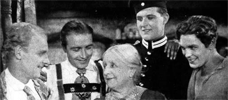
Four Sons
1928 -
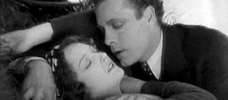
The Crowd
1928 -

A Girl in Every Port
1928 -
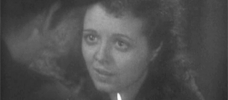
Street Angel
1928 -

The Patsy
1928 -
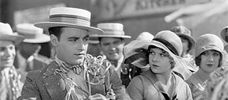
Lonesome
1928 -

Our Dancing Daughters
1928 -
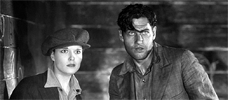
Beggars of Life
1928 -
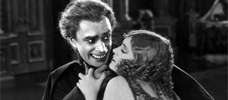
The Man Who Laughs
1928 -

The Docks of New York
1928 -
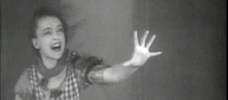
The Wind
1928 -
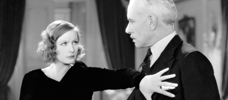
A Woman of Affairs
1928 -
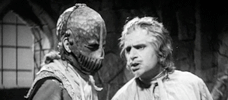
Iron Mask
1929 -
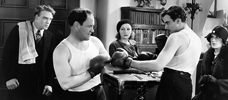
The Single Standard
1929 -
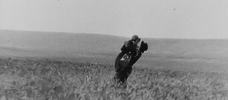
City Girl
1930 -
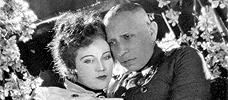
The Wedding March
1928
We don’t do comments anymore, but you may contact us here or find us on Twitter or Facebook.



